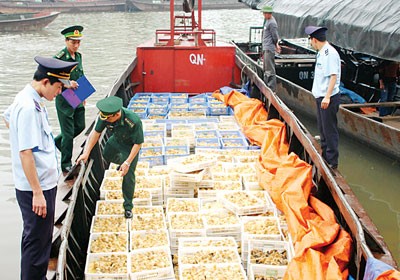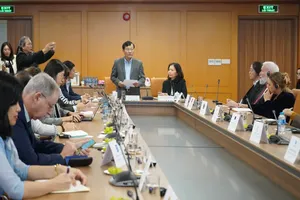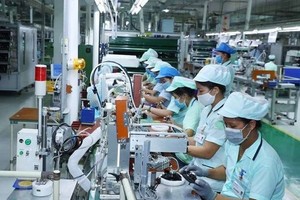Deputy Prime Minister Nguyen Thien Nhan has entrusted the Ministry of Industry and Trade, and Ministry of Agriculture and Rural Development, to come up with a project report by October, on ways to prevent illicit seafood from entering the country.
In particular, the Ministry of Industry and Trade will be responsible for prevention of smuggling of seafood at border gates. The Ministry of Agriculture and Rural Development on the other hand will control the domestic-breeding of seafood, seafood circulation in the market, and checking of quarantine and issuance of the same.

According to a report by the Central Interdisciplinary Steering Committee, smuggling of seafood without clear origin is currently a major problem. In the past six months, environmental police uncovered and fined 40 cases of illegally imported seafood, and seized 30 tons of seafood, of which sturgeon accounted for 10 tons.
Beside sturgeon, there was other illicit seafood without clear origin, such as frogs, air-breathing catfish, and snake-head fish, which are hard to distinguish from domestically-bred ones. All smuggled seafood is sold openly at wholesale and retail markets.
Tests showed that the illicit seafood, namely, 10 percent of sturgeons, 10 percent of air-breathing catfish, and 20 percent of snake-head fish, contained harmful residues.
Police had also uncovered 500 cases of illicit poultry and destroyed 127 tons of chickens, more than 46 tons of poultry meat and thousands of poultry eggs in the past six months.
Authorities also collected and tested nearly 34,000 food samples and found nearly 5,700 food samples, or 16.7 percent of samples, containing formaldehyde, borax, and preservative exceeding permissible limits.
As for food poisoning, in the first six months of this year, 87 cases of food poisoning have been reported, hospitalizing 1,649 people and killing 18 others. These figures were lower than those in the same period last year. However, there were more food poisoning cases reported in July.
Deputy Prime Minister Nhan has ordered authorities to intensify inspections on food safety and slap strict penalties on violators.
























